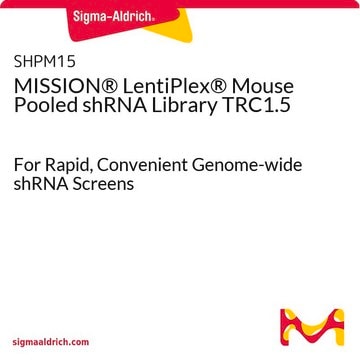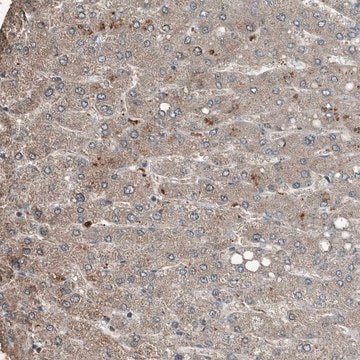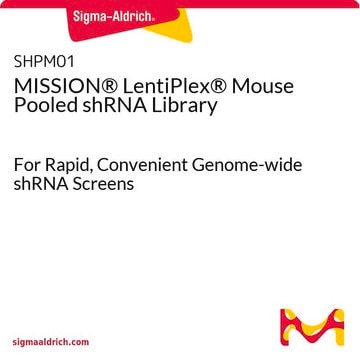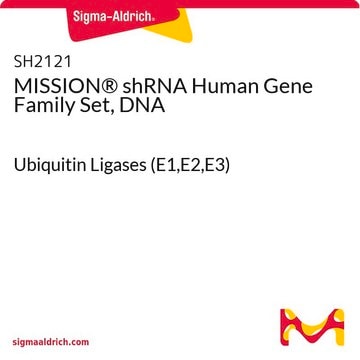推薦產品
產品線
MISSION®
濃度
≥5x108 VP/ml (via p24 assay)
技術
capture ELISA: 5 x 108 TU/mL using p24
運輸包裝
dry ice
儲存溫度
−70°C
一般說明
MISSION LentiPlex Pooled Libraries bring the power of the MISSION TRC shRNA collection together with Sigma′s lentiviral manufacturing expertise to enable genome-wide RNAi screens at your bench-top. The LentiPlex pooled system provides enhanced delivery and long-term gene silencing in non-dividing and primary cell lines allowing unlimited discovery potential. The convenient format now makes rapid whole-genome RNAi screens accessible to any researcher with minimal reagent, time or capital equipment investment.
The MISSION LentiPlex Mouse shRNA Pooled Library 2.0 includes additional gene and clone coverage from the previously offered LentiPlex 1.0 Pooled Library . With the addition of 2.0, which consists of 7,000+ mouse genes and 25,000+ total clone coverage divided into 3 subpools, the complete whole-genome mouse library complete whole-genome mouse librarynow consists of over 110,000 shRNA constructs from the TRC collection targeting 21,000+ mouse genes. Each library is tested for shRNA representation before product release to ensure robust library coverage. The complete library is provided in ready-to-use lentiviral format at titers of at least 5 x 108 TU/ml via p24 assay and is pre-divided into fifteen subpools of approximately 5,500-8,000 shRNA constructs each. Amplification and sequencing primers are also provided for downstream target identification.
For more information including sample data and uses, please visit our LentiPlex Technical Detail Page.
The MISSION LentiPlex Mouse shRNA Pooled Library 2.0 includes additional gene and clone coverage from the previously offered LentiPlex 1.0 Pooled Library . With the addition of 2.0, which consists of 7,000+ mouse genes and 25,000+ total clone coverage divided into 3 subpools, the complete whole-genome mouse library complete whole-genome mouse librarynow consists of over 110,000 shRNA constructs from the TRC collection targeting 21,000+ mouse genes. Each library is tested for shRNA representation before product release to ensure robust library coverage. The complete library is provided in ready-to-use lentiviral format at titers of at least 5 x 108 TU/ml via p24 assay and is pre-divided into fifteen subpools of approximately 5,500-8,000 shRNA constructs each. Amplification and sequencing primers are also provided for downstream target identification.
For more information including sample data and uses, please visit our LentiPlex Technical Detail Page.
其他說明
The MISSION LentiPlex Mouse Pooled shRNA Libraries consist of Catalog Numbers SHPM01, SHPM15, SHPM2, and SHPMLIBR. Please refer to Table 1 for approximate number of shRNA clone coverage, targeted genes, and subpools for each library.
Amplification and sequencing primers are also provided for downstream hit identification.
Deconvolution of shRNA Pools
Sigma′s deconvolution service lets you easily identify the genes that impact your pooled shRNA screen.
Contact your local Sigma sales representative for more information or submit an inquiry to MISSION RNAi
Amplification and sequencing primers are also provided for downstream hit identification.
Deconvolution of shRNA Pools
Sigma′s deconvolution service lets you easily identify the genes that impact your pooled shRNA screen.
- Next-generation sequencing of clonesgives a precise number of individual clone occurrence within a pooled shRNA sample
- Comprehensive, reproducible results from pooled shRNA screens
- Statistically robust and information-rich data
Contact your local Sigma sales representative for more information or submit an inquiry to MISSION RNAi
推薦產品
Browse additional MISSION shRNA Gene Family Sets in our MISSION shRNA portal
法律資訊
LentiPlex is a registered trademark of Merck KGaA, Darmstadt, Germany
MISSION is a registered trademark of Merck KGaA, Darmstadt, Germany
儲存類別代碼
12 - Non Combustible Liquids
水污染物質分類(WGK)
WGK 3
閃點(°F)
Not applicable
閃點(°C)
Not applicable
分析證明 (COA)
輸入產品批次/批號來搜索 分析證明 (COA)。在產品’s標籤上找到批次和批號,寫有 ‘Lot’或‘Batch’.。
Functional dissection of lysine deacetylases reveals that HDAC1 and p300 regulate AMPK.
Lin, Yu-yi, et al.
Nature (2012)
Christine Karlsson et al.
Methods in molecular biology (Clifton, N.J.), 650, 29-43 (2010-08-06)
Identifying the genes and pathways that regulate self-renewal and differentiation in somatic stem cells is a central goal in stem cell and cancer biology. Here, we describe a method for RNAi-based screens in primary human hematopoietic stem and progenitor cells.
Richard Possemato et al.
Nature, 476(7360), 346-350 (2011-07-16)
Cancer cells adapt their metabolic processes to drive macromolecular biosynthesis for rapid cell growth and proliferation. RNA interference (RNAi)-based loss-of-function screening has proven powerful for the identification of new and interesting cancer targets, and recent studies have used this technology
文章
RNAi Consortium (TRC): Collaborative effort among academic labs and biotech/pharma institutes advancing RNA interference research.
我們的科學家團隊在所有研究領域都有豐富的經驗,包括生命科學、材料科學、化學合成、色譜、分析等.
聯絡技術服務







